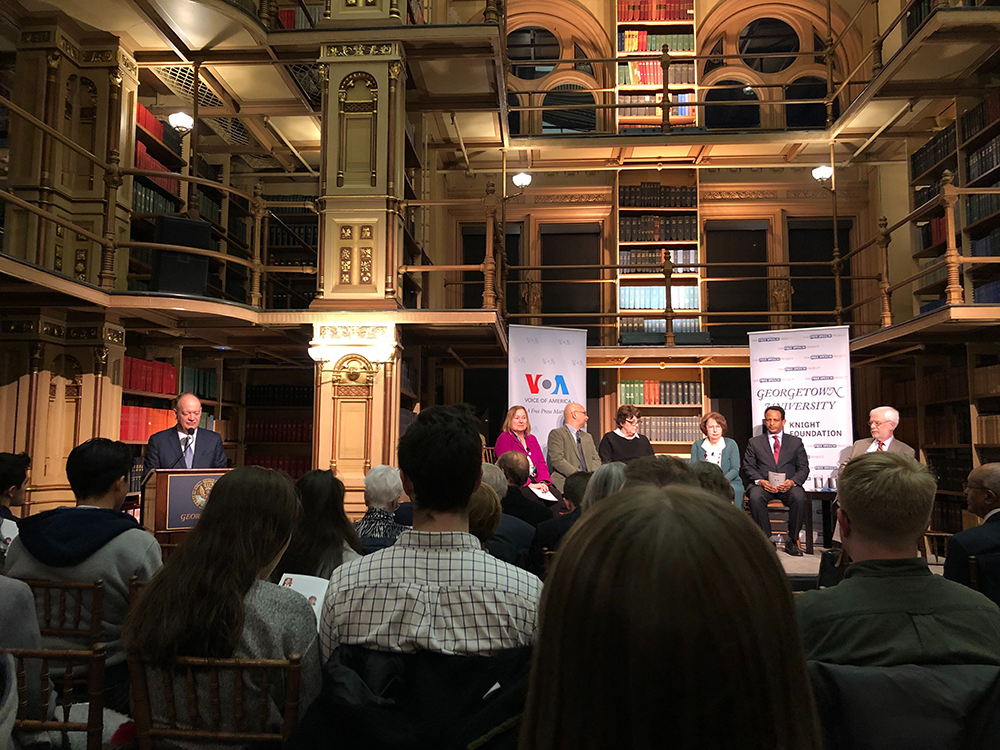Freedom of expression is a universal aspiration among people, but journalists and policymakers must be cognizant of diverse cultural and political circumstances when promoting free speech abroad, panelists said at a Jan. 30 event.
The event, titled “Exporting the First Amendment: Noble, Impractical, or Wrong?,” was hosted by The Free Speech Project, a nonpartisan initiative working to assess the condition of free speech in the United States. At the event, panelists discussed the intersection of international journalism and the spread of free speech around the world.

Journalists who attempt to promote free speech in countries with oppressive regimes face great risks, according to the Director of Voice of America, an international news and broadcast organization, Amanda Bennett, who moderated the event.
“Everyday I’m watching people in repressive regimes come to seek us out even when their countries block us out, and I take it from that that there is a huge demand around the world for a free press,” Bennet said. “But, one of the things that we notice, is also we find we’re putting our journalists often in great risk to make them a part of this endeavor.”
These foreign journalists who face censorship in their native countries may face dangerous repercussions from their governments for their commitment to free press, according to Foreign Affairs Columnist for the Philadelphia Inquirer Trudy Rubin.
“What I find is that there is an instinctive hunger for young people who have an interest in journalism to try to get information, real information,” Rubin said. “Over and over again, I’ve found this bravery, but it does create moral issues.”
Rubin specifically cited cases in Syria where local journalists trained in reporting were killed as part of the ongoing conflict in the region to illustrate threats to free speech. An estimated 147 Syrian journalists have been killed between 1992 and 2020, according to the Committee to Protect Journalists.
Austin Tice, a second-year law student at the Georgetown University Law Center, went missing in Syria in 2012 while traveling in the country to report on the escalating civil war between the Syrian government and rebel forces. Tice is believed to have been kidnapped by an affiliate of the Syrian government.
Other featured panelists for the event included Ethiopian Ambassador to the United States H.E. Fitsum Arega, Associate Editor at The Washington Post Karen DeYoung and U.S. Correspondent for the Straits Times of Singapore Nirmal Ghosh.
When covering political issues, such as ethnic conflicts in foreign nations, journalists need to educate themselves on the country’s history to gain a better understanding of the context of the situation, according to Ghosh.
“I think there should be cognizance of the nuances of the history of the ethic divisions, the bad baggage of post-colonial history,” Ghosh said. “I find that in the modern discourses, even in the media because the news cycle has become so franetic, and its instant, that it often lacks context. It lacks historical context, it lacks immediate context.”
When traveling to foreign countries, journalists can gain valuable perspectives from interacting with locals, according to DeYoung.
“We as correspondents going places, I think that we find in dealing with local journalists that they are really, without exception, in my case at least, are so eager to seek you out and actually help you,” DeYoung said. “And I think that as correspondents we really couldn’t even do our jobs if we didn’t have the assistance of local reporters.”
In a time when foreign countries face threats to free speech, many foreign citizens see the United States as the protector of free speech around the world, which is an image the U.S. must strive to maintain, according to Ghosh.
“America has always stood for something, despite its credibility issues and its had credibility issues all the time, supporting dictators, regimes and so forth,” Ghosh said. “But it’s always stood for something and if that gets eroded, that’s a problem.”




















